高考英语二轮语法专题复习-专题6 情态动词和虚拟语气 导学案(含答案)2026届高三英语上学期一轮复习专项
文档属性
| 名称 | 高考英语二轮语法专题复习-专题6 情态动词和虚拟语气 导学案(含答案)2026届高三英语上学期一轮复习专项 |
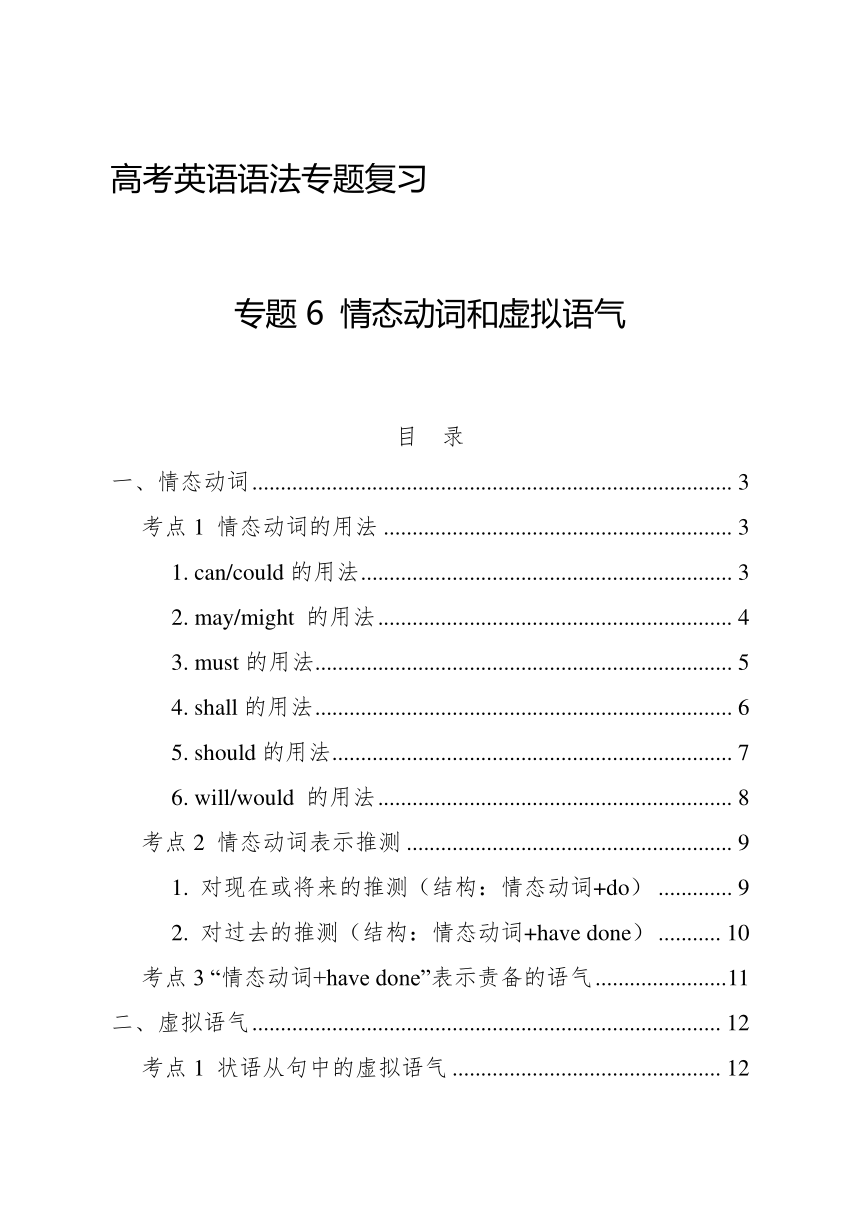
|
|
| 格式 | docx | ||
| 文件大小 | 47.9KB | ||
| 资源类型 | 教案 | ||
| 版本资源 | 人教版(2019) | ||
| 科目 | 英语 | ||
| 更新时间 | 2025-07-18 16:42:19 | ||
图片预览

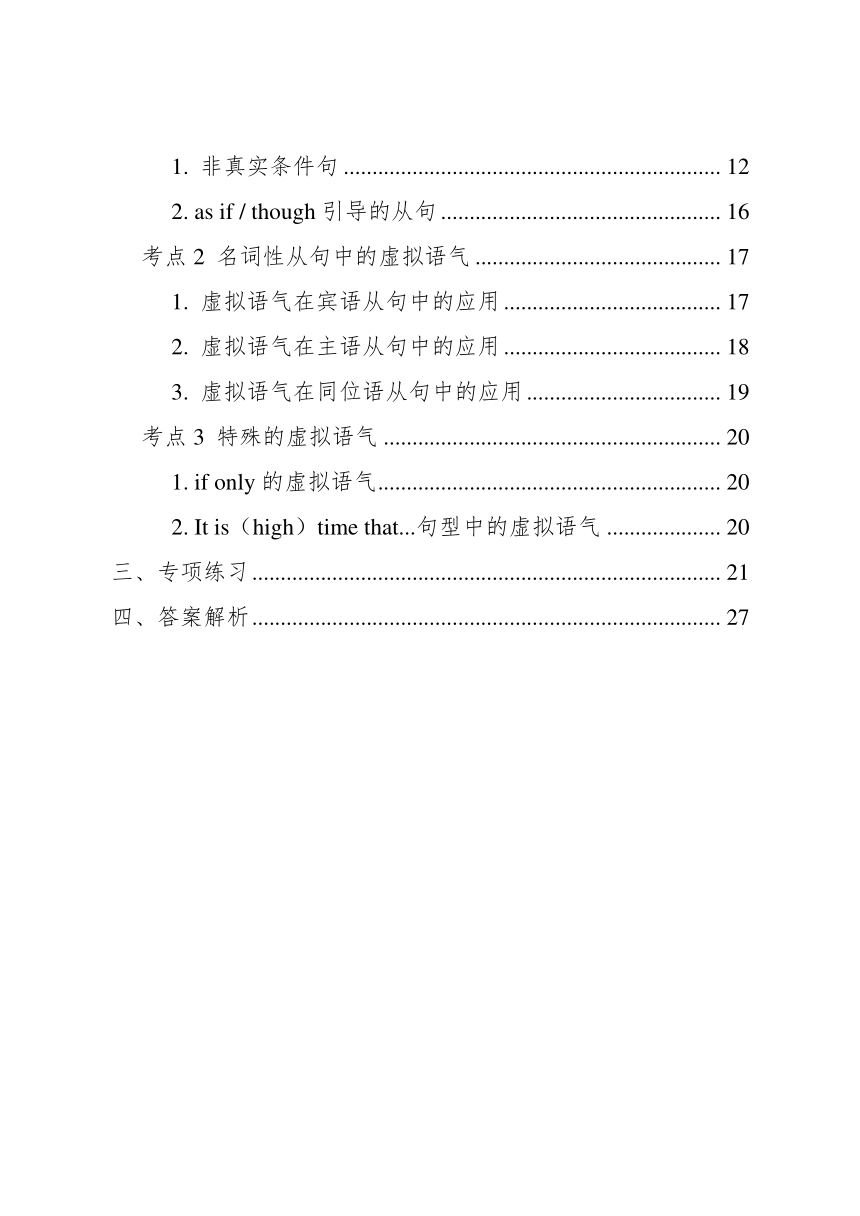
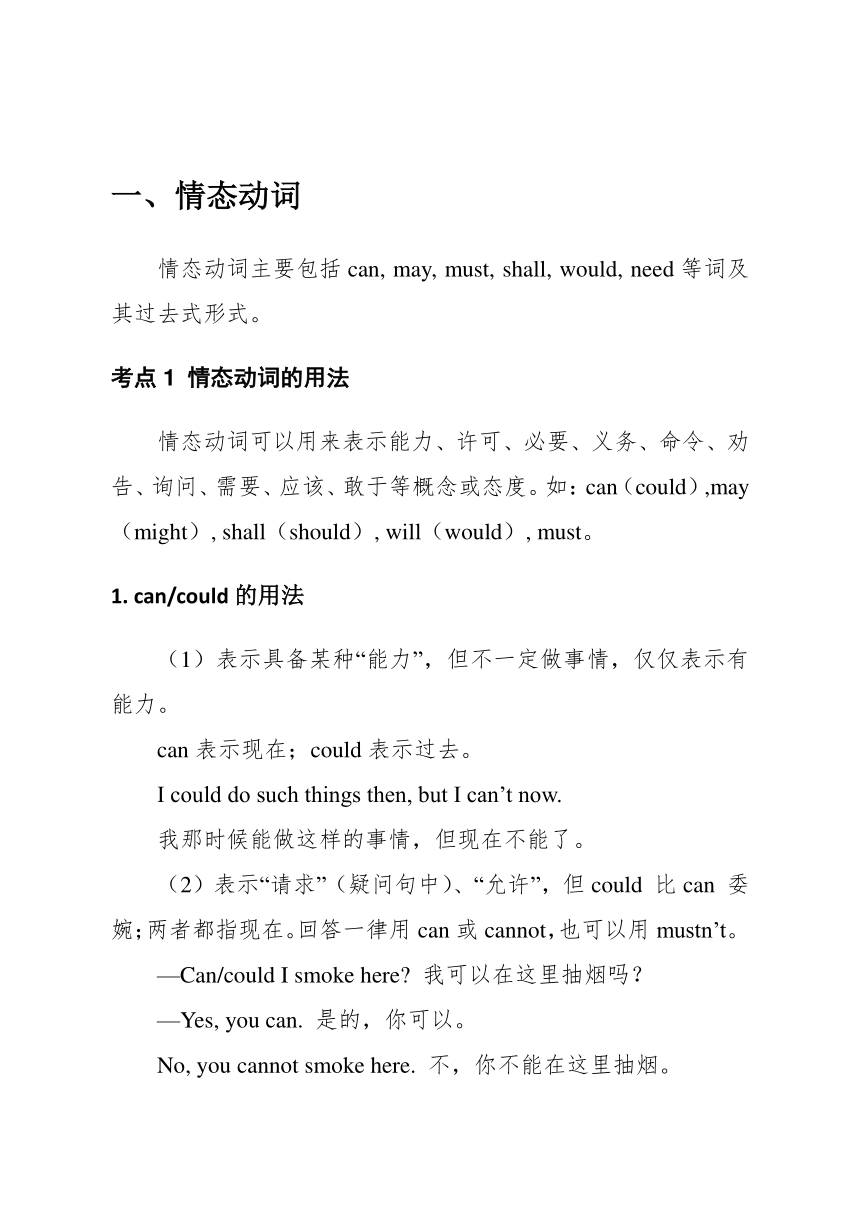
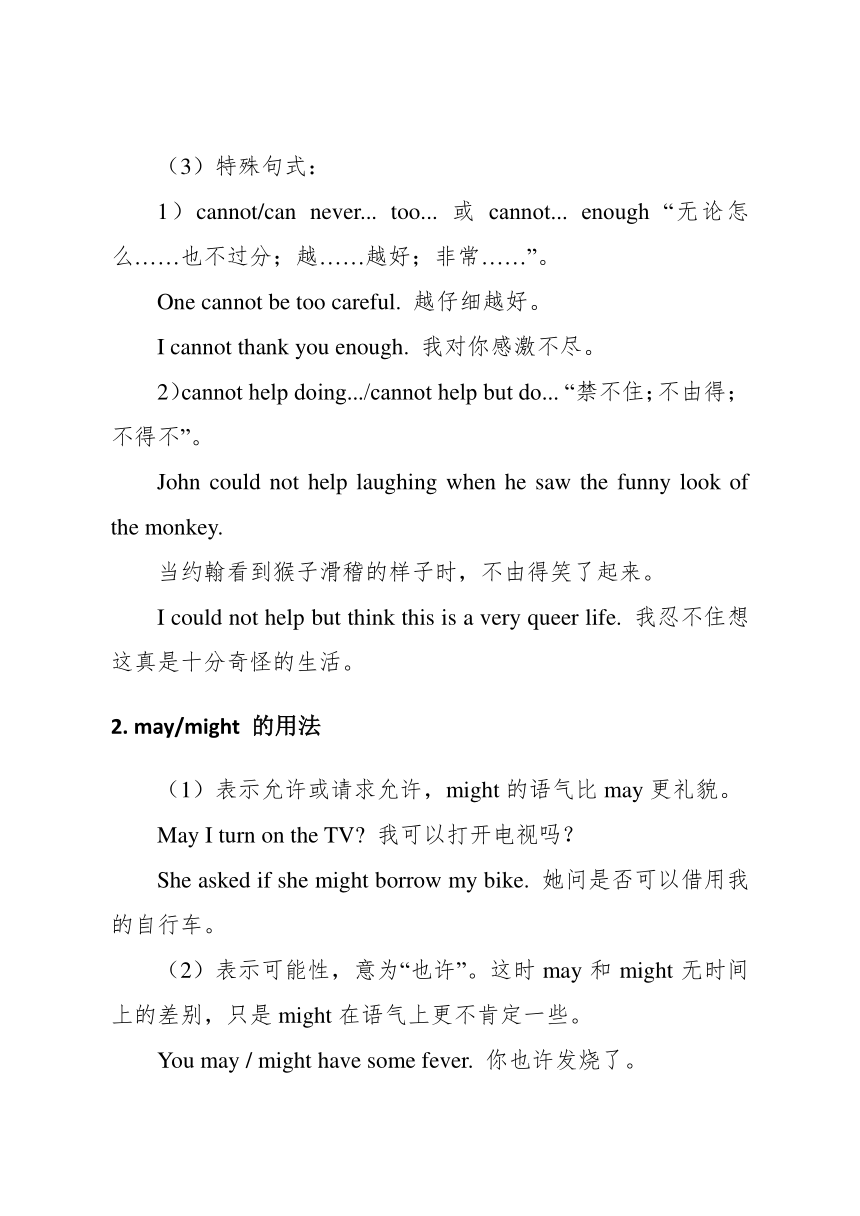
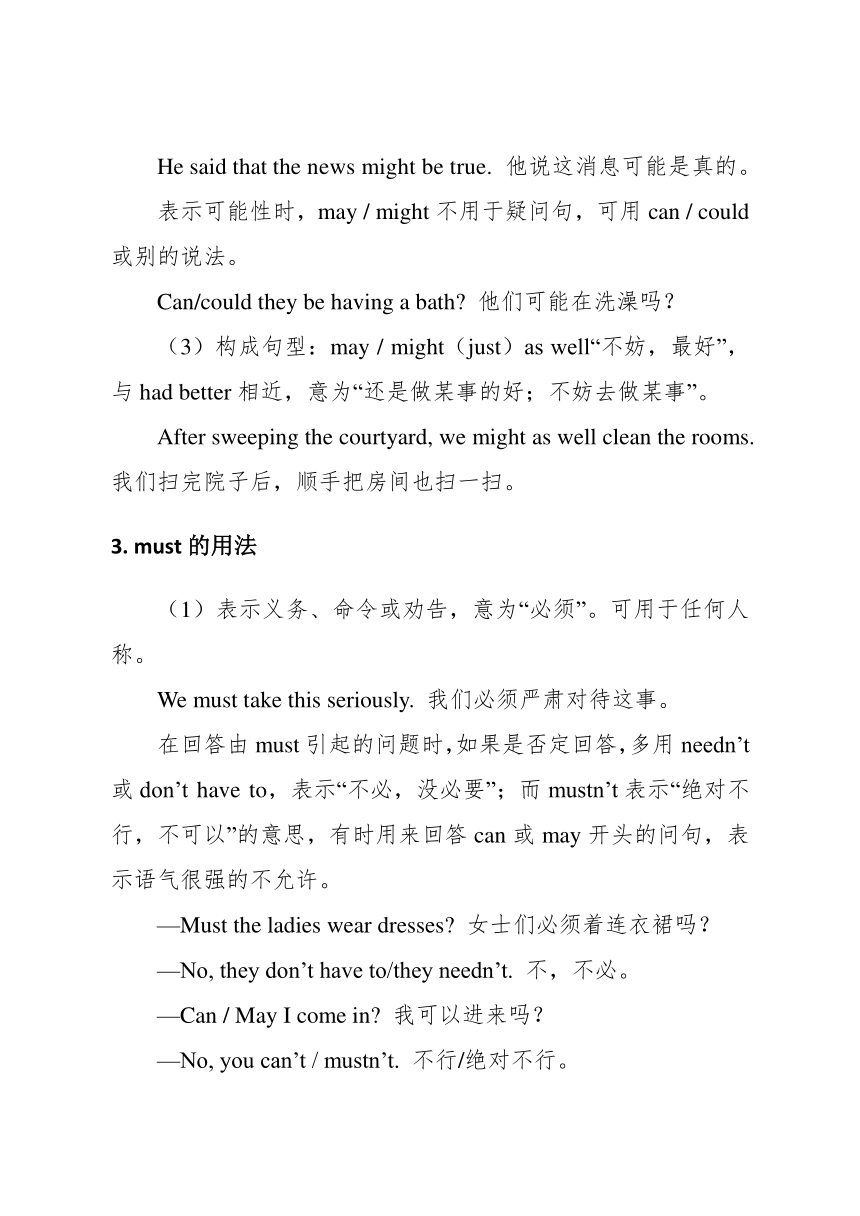
文档简介
高考英语语法专题复习
专题6 情态动词和虚拟语气
目 录
一、情态动词 3
考点1 情态动词的用法 3
1. can/could的用法 3
2. may/might 的用法 4
3. must的用法 5
4. shall的用法 6
5. should的用法 7
6. will/would 的用法 8
考点2 情态动词表示推测 9
1. 对现在或将来的推测(结构:情态动词+do) 9
2. 对过去的推测(结构:情态动词+have done) 10
考点3 “情态动词+have done”表示责备的语气 11
二、虚拟语气 12
考点1 状语从句中的虚拟语气 12
1. 非真实条件句 12
2. as if / though引导的从句 16
考点2 名词性从句中的虚拟语气 17
1. 虚拟语气在宾语从句中的应用 17
2. 虚拟语气在主语从句中的应用 18
3. 虚拟语气在同位语从句中的应用 19
考点3 特殊的虚拟语气 20
1. if only的虚拟语气 20
2. It is(high)time that...句型中的虚拟语气 20
三、专项练习 21
四、答案解析 26
一、情态动词
情态动词主要包括can, may, must, shall, would, need等词及其过去式形式。
考点1 情态动词的用法
情态动词可以用来表示能力、许可、必要、义务、命令、劝告、询问、需要、应该、敢于等概念或态度。如:can(could),may(might), shall(should), will(would), must。
1. can/could的用法
(1)表示具备某种“能力”,但不一定做事情,仅仅表示有能力。
can表示现在;could表示过去。
I could do such things then, but I can’t now.
我那时候能做这样的事情,但现在不能了。
(2)表示“请求”(疑问句中)、“允许”,但could 比can 委婉;两者都指现在。回答一律用can或cannot,也可以用mustn’t。
—Can/could I smoke here 我可以在这里抽烟吗?
—Yes, you can. 是的,你可以。
No, you cannot smoke here. 不,你不能在这里抽烟。
(3)特殊句式:
1)cannot/can never... too... 或cannot... enough “无论怎么……也不过分;越……越好;非常……”。
One cannot be too careful. 越仔细越好。
I cannot thank you enough. 我对你感激不尽。
2)cannot help doing.../cannot help but do... “禁不住;不由得;不得不”。
John could not help laughing when he saw the funny look of the monkey.
当约翰看到猴子滑稽的样子时,不由得笑了起来。
I could not help but think this is a very queer life. 我忍不住想这真是十分奇怪的生活。
2. may/might 的用法
(1)表示允许或请求允许,might的语气比may更礼貌。
May I turn on the TV 我可以打开电视吗?
She asked if she might borrow my bike. 她问是否可以借用我的自行车。
(2)表示可能性,意为“也许”。这时may和might无时间上的差别,只是might在语气上更不肯定一些。
You may / might have some fever. 你也许发烧了。
He said that the news might be true. 他说这消息可能是真的。
表示可能性时,may / might不用于疑问句,可用can / could或别的说法。
Can/could they be having a bath 他们可能在洗澡吗?
(3)构成句型:may / might(just)as well“不妨,最好”,与had better相近,意为“还是做某事的好;不妨去做某事”。
After sweeping the courtyard, we might as well clean the rooms.我们扫完院子后,顺手把房间也扫一扫。
3. must的用法
(1)表示义务、命令或劝告,意为“必须”。可用于任何人称。
We must take this seriously. 我们必须严肃对待这事。
在回答由must引起的问题时,如果是否定回答,多用needn’t或don’t have to,表示“不必,没必要”;而mustn’t表示“绝对不行,不可以”的意思,有时用来回答can或may开头的问句,表示语气很强的不允许。
—Must the ladies wear dresses 女士们必须着连衣裙吗?
—No, they don’t have to/they needn’t. 不,不必。
—Can / May I come in 我可以进来吗?
—No, you can’t / mustn’t. 不行/绝对不行。
(2)表示推测,表示“肯定,一定”之意,此时,must只用于肯定句。在否定句或疑问句中,用can / could。
They must be watching the news now. 他们这会儿肯定在看新闻。
They can’t / couldn’t be watching the news now. 他们这会儿不可能在看新闻。
Can / Could they be watching the news now 他们这会儿可能在看新闻吗?
(3)表示“偏偏,非要,硬要”,有时表示不巧,有时表示固执,通常都是指令人不快的事。
Must you make so much noise 你非要弄出这么多噪音吗?
Why must you always interrupt me 你为什么非要老是打断我?
Just when I was busy, the neighbor must come and chatter.正当我忙碌的时候,邻居偏偏过来唠叨。
4. shall的用法
(1)用于第二、三人称,表示说话人的命令、警告、强制、允诺、威胁或决心等。
You shall go to the ball. 你得去参加舞会。
He shall stay in bed. 他必须躺在床上。
(2)表示强制,用于法令、条约、规章中,意为“必须,应该”。
Candidates shall remain in their seats until all the papers have been collected.
试卷完全收回后,应试者才能离开座位。
(3)用于疑问句中,与第一、三人称连用,表示征求对方的意见,may用于征求对方的许可,shall用于征求对方的意见或指示。
Shall I turn on the lights 我可以开灯吗?
Shall he wait for you outside 要不要他在外面等你?
5. should的用法
与ought to意思相近,但语气较ought to弱些;可表示推测,意为“可能,该”。
(1)表示“应该,应当”。
You should help your mother with the housework. 你应该帮你母亲做家务。
Should I wear a coat 我要穿大衣吗?
(2)表示“可能,该(=will probably)”,是一种试探性的推断。
He should arrive soon. 他可能很快就到了。
The train should have already left. 火车应该已经走了。
(3)表示“竟然”。
It’s strange that he should be late. 真奇怪,他竟会迟到。
(4)should have done表示“本应该做某事,但事实上却没有做”;
shouldn’t have done表示“本不该做某事,但事实上却做了”。
You should have got up earlier. 你本应该早点起的。
You shouldn’t have told him about it. 你本不该把这件事告诉他的。
6. will/would 的用法
(1)表示请求、建议等,would比will委婉客气。
Would you pass me the book 你把那本书递给我好吗?
(2)表示意志、愿望和决心。
I will never do that again. 我再也不会那样做了。
They asked if we would do that again. 他们问到,我们是否愿意再次那样做。
(3)用will be和“will(would)+have+过去分词”的结构表示推测,主要用于第二、三人称。前者表示对目前情况的推测,后者表示对已经完成的动作或事态的推测。
This will be the book you want. 这本书应该是你想要的。
I thought you would have finished this by now. 我认为你现在应该已经完成了。
(4)will表示习惯、请求等。
Every day he will sit here hour after hour doing nothing.(习惯)
他每天就坐在那里,却什么事也不做。
Will you help me with my English (请求)你能帮我提高我的英语吗?
(5)would可表示过去反复发生的动作或某种倾向。would表示过去习惯时比used to正式,并没有“现已无此习惯”的含义。
During the vacation he would visit me every week. 假期里,他每个星期都会来看我。
考点2 情态动词表示推测
must, can/could, may/might可以用来表示对事情进行推测。其中,must语气最强,表示“一定”(只用于肯定句中),may语气次之,表示“可能”,might/could语气最弱,表示“也许,或许”,can表示推测时一般用于否定句和疑问句中,在否定推测中语气最强,其次是can’t,意为“不可能”,may not(可能不)和might not/could not(或许不)的语气最弱。
1. 对现在或将来的推测(结构:情态动词+do)
情态动词可以用来表示对现在或将来的情况进行推测。
You have worked hard all day. You must be tired. 你辛苦工作了一整天,一定累了。
She might come soon. 或许她很快就来了。
She could be lost. 她可能迷路了。
She may be in the wrong room. 她可能走错了房间。
The man over there can’t be Jack—he’s in hospital.
那边的那个人不可能是杰克——他住院了。
注意:如果是对现在或未来正在发生的事情进行推测,可以使用“情态动词+be doing”结构。
My friend may be still sleeping at home now.
我的朋友现在可能正在家里睡觉。
Can we be working at the same company next year
明年我们还能在同一家公司上班吗?
2. 对过去的推测(结构:情态动词+have done)
情态动词还可用于表示对过去事情的推测。
She might have got up late. 她可能是起来晚了。
He may have felt ill. 他可能是生病了。
His clothes is wet. He must have forgotten to bring the umbrella.他的衣服湿了。他一定忘记带伞了。
He can’t have stayed at home, for I just met him in the library.他不可能在家,因为我刚刚在图书馆遇见他了。
She could have taken the wrong bus. 她可能坐错了公交车。
注意:could可以表示过去笼统的而不是具体的可能性,此时不需采用could+have done的结构,而直接使用could do的结构即可。
Prices could be high in the sixteenth century. 16世纪的物价可能很高。
考点3 “情态动词+have done”表示责备的语气
可用于表责备语气的情态动词有:should, ought to, could, might,need等,它们常被用来表示说话人对过去事情的不满或遗憾,带有较强烈的责备语气,其结构为“情态动词+have done”。
1. should(ought to)have done“本应该……”
表示过去应该做而(实际)没有做的事情,含有责备或遗憾的语气,其否定形式为“should not/ought not to have done”。should have done还可以用来表示惊讶、赞叹等情绪。
You should have dug some when you first saw them blooming this spring.
你应该在今年春天第一次看到它们盛开的时候就挖一些的。
2. could/might have done “本来能够(会)……”
表示过去本来能够(可以)做某事,但实际上没有做到。
I could have lent you the money. Why didn’t you ask me
我本来可以借这笔钱给你的。你为什么不问问我?
3. need+have+done “原本需要做……”
表示本来需要做某事而没有做,“needn’t+have+done”则表示“本来不必做某事而做了”。
I needn’t have bought so much wine—only five people came.
我本来没有必要买这么多酒,只来了五个人。
He need have hurried to the station. In that case, he wouldn’t have missed the train.
他本来需要快点去车站,那样的话,他就不会误了火车。
二、虚拟语气
虚拟语气可以用来表示说话人主观上所说的话并不是事实,而是一种假设、愿望、建议、请求、命令、空想、猜测、必要性和可能性等。
考点1 状语从句中的虚拟语气
1. 非真实条件句
(1)虚拟现在时(与现在事实相反),从句谓语形式用动词的过去式(be一般用were,而不用was),主句谓语形式为“should(would,could, might)+动词原形”。
If I knew her number I could ring her up.
要是我知道她的电话号码,我就可以给她打电话了。(事实是我不知道)
(2)虚拟过去时(与过去事实相反),从句谓语形式用“had+过去分词”,主句谓语形式为“should(would, could, might)+have+过去分词”。
If we had found him earlier we could have saved his life.
要是我们当时早点找到他的话,我们就可以救活他。(事实是我们没能早点找到他)
(3)虚拟将来时(与将来事实相反),从句谓语形式用动词的一般过去式,或“were to+动词原形”或“should+动词原形”,主句谓语形式“should(would, could, might)+动词原形”。
If I asked him, I’m sure he’d help us.
如果我恳求他,他肯定会帮助我们。(事实是我不打算恳求他)
注意:特殊情况
① 虚拟条件从句和主句动作发生的时间不一致时,主句和从句的谓语动词要根据各自所指的不同时间选用适当的虚拟语气形式,这种现象称为错综时间虚拟条件句。
If you had spoken to him last time you saw him, you would know what to do now.
如果你上次见他时和他说过话,你就会知道你现在要做些什么。(过去+现在)
② 若虚拟条件句中含有were或had, should等助动词或情态动词时,连词if可以省略,而将were, had, should提前,构成倒装语序。
Were I in your position(=If I were in your position)I would go.
如果我处在你的处境,我就走了。
Had you arrived five minutes earlier(=If you had arrived five minutes earlier), you could have seen them off. 如果你早到五分钟,你就可以给他们送行了。
Should he come(=If he should come), tell him to ring me up.
如果他来的话,叫他打电话给我。
③ 利用语境不直接说出条件的句子称为含蓄虚拟条件句。
A. 用介词引入条件
* but for(若不是,如没有):注意,凡是出现这个复合介词的句子,必须要用虚拟语气。
We would have had a pleasant journey but for the rain.(=We would have had a pleasant journey if it hadn’t rained.)如果没有下雨,我们的旅程会很愉快。
* without/with(在不具备/具备……的条件下)。
Without his help, I could not have done it well.(=If he hadn’t helped me, I could not have done it well.)要是没有他的帮助,我们不可能做得这么顺利。
With favorable winds, we might have got there in two days.(=If there should be favorable winds, we might have got there in two days.)要是顺风的话,我们可能两天后就抵达那里了。
B. 分词短语充当条件状语(分词短语本身就具有充当条件状语的功能)。
Given a certain opportunity, he could have shown more talent.(=If he had been given a certain opportunity, he could have shown more talent.)要是能有一定的机会,他也许就能展示出更大的才能。
C. 用上下文暗示条件。常用来表示不具备条件的连词,如:but, or或otherwise等。
I would have failed but that you helped me. 要不是你们帮助我,我就会失败。(but表示让步关系,意为“除非,要不是”,常与that一起构成but that,相当于if... not...)
I was so busy then, otherwise, I would have finished it.(If I hadn’t been busy then, I would have finished it.)那时我很忙,否则我早就完成了。
I might have given you more help, but I was too busy.
我可能会给你更多的帮助的,但那时我太忙了。
More water and the young trees couldn’t have died.(=If you had given them more water, the young trees couldn’t have died.)如果你给那些小树多浇点水,它们就不会死了。
2. as if / though引导的从句
在as if或as though引导的方式状语从句或表语从句中,用过去时表示与现在事实相反或对现在情况有怀疑;用过去完成时表示对过去事实或过去想象中的动作或情况。
The teacher treats the pupil as if/as though he were her own child.
这位老师对待这位学生就像对自己的孩子一样。(对现在的虚拟)
He looks as if/as though he had been hit by lighting.
他看起来像曾经被雷击过似的。(对过去的虚拟)
They talked and talked as if/as though they would never meet again.
他们说啊说,就好像他们再也见不到对方了一样。(对将来的虚拟)
考点2 名词性从句中的虚拟语气
1. 虚拟语气在宾语从句中的应用
(1)在表示愿望的动词wish之后的宾语从句中,需用虚拟语气。宾语从句用过去时表示与现在事实相反;用过去完成时表示与过去事实相反。
I wish I knew what was going to happen. 我真希望我能知道要发生什么事。
She wished she had stayed at home. 她希望当时她在家。
I wish I were rich. 我真希望我很有钱。
(2)在表示“坚持”“命令”“建议”“要求”等词后的宾语从句要用虚拟语气。这类动词简称“一二四四”: 一个坚持(insist);两个命令(order, command);四项要求(demand, desire, require, request);四条建议(advise, suggest, propose, recommend)。这类虚拟语气由“should+动词原形”构成,其中的should在美式英语中通常可以省略。
He insisted that I(should)go with them. 他坚持要我同他们一起去。
He ordered that it(should)be sent back. 他命令把它送回去。
The doctor advised that he not smoke. 医生建议他不要抽烟。
注意:当insist表示“坚称,坚持认为”和suggest表示“表明,暗示”时,其后的从句中不用虚拟语气。
The look on his face suggested that he was quite satisfied with what I had done for him. 他的表情暗示出他对我为他所做的事非常满意。
He insisted that he was honest. 他坚持认为自己是诚实的。
(3)would rather用来表示主观愿望,其后的宾语从句也需用虚拟语气,谓语动词常用过去式。
I’ d rather you went tomorrow. 我宁愿你明天去。
Kate went by car and I’d rather she hadn’t. 凯特是坐汽车去的,我宁愿她不坐汽车去。
2. 虚拟语气在主语从句中的应用
(1)在某些表示愿望、请求、建议、命令等形容词之后的主语从句中,需用虚拟语气,其谓语形式为“(should)+动词原形”,其中should可以省略。这类形容词常见的有:necessary(必要的),important(重要的), essential(紧要的), imperative(迫切的),urgent(紧迫的)等。
It’s important that we(should)take good care of the patient.
重要的是我们要照顾好病人。
(2)在“It is desired(suggested, ordered, insisted, decided...)
that...”主语从句中,常用虚拟语气,谓语形式为“(should)+动词原形”。
It is desired that this rule be brought to the attention of the staff.
希望这条规则引起全体职员的注意。
(3)在“It is+n.+主语从句”这一句型中,主语从句要用虚拟语气,此句型中的名词有两类:一类是表示建议、请求、命令等含有主观意向的动词的同源名词,如suggestion, proposal等;另一类是表示遗憾、惊奇、怀疑等主观看法的名词,如shame, pity等,其从句中的谓语动词形式为“(should)+动词原形”。
It is my proposal that he be sent to study abroad. 我建议派他去国外学习。
It was a pity that you couldn’t come. 你不能来,真是太可惜了。
3. 虚拟语气在同位语从句中的应用
同位语从句的先行词通常是表示说话人愿望、建议、要求、命令等的名词,其同位语从句需使用虚拟语气,谓语形式为“(should)+动词原形”。
The suggestion that students learn something practical is worth considering.
学生应该学习些实用知识的建议是值得考虑的。
考点3 特殊的虚拟语气
1. if only的虚拟语气
if only也可用于表示与事实相反的愿望,意为“若是……那该多好啊;真希望……”。若表示与现在事实相反,谓语动词应用过去式;如果表示与过去事实相反,应用过去完成时态。
If only I were as clever as you!
要是我像你一样聪明该多好啊!
If only you had not told Tom what I said, everything would have been all right.
要是你没有把我的话告诉汤姆就好了,那样就不会出什么问题了。
2. It is(high)time that...句型中的虚拟语气
It is(high)time that...意为“(早)该是做……的时间了”,后面的从句也需使用虚拟语气形式,即谓语动词要用过去式或用should加动词原形,此时should不可省略。
It is time that the children went to bed. 孩子们该睡觉了。
It is high time that we should set up a new plant in this country.我们早该在这个国家设立新工厂了。
三、专项练习
I. 单句改错。(仅限1处)
1. We suggest that Henry is told about his condition as soon as possible.
2. His English is so poor. He mustn’t be an English native speaker.
3. The teacher insisted that we must hand in our exercise before supper.
4. John’s grade on the test is the highest in his class, so he should have studied last night.
5. I’m feeling much better now, so you mustn’t call the doctor.
II. 在空白处填写1个适当的单词或括号内单词的正确形式。
6. If the whole operation ______(not plan)before hand, a great deal of time and money would have been lost.
7. Tom suggested that we ______(not hold)such a meeting, but Jenny insisted that it ______(be)of great importance.
8. The room is in a terrible mess; it can’t ______(clean).
9. George ______(can, go)too far. His coffee is still warm.
10. One of our rules is that every student ______ wear school uniform while at school.
11. —______ you interrupt now Can’t you see I’m on the phone
—Sorry sir, but it’s urgent.
12. He ______ have completed his work; otherwise, he wouldn’t be enjoying himself by seaside.
13. John went to the hospital alone. If he ______(told)me about it, I would have gone with him.
14. Had I known about this computer program, a huge amount of time and energy ______(save).
15. —If the traffic hadn’t been so heavy, I could have been back by 6 o’clock.
—What a pity! Tina ______(be)here to see you.
III. 单项选择。
16. —Shall I inform him of the change of the schedule right now
—I am afraid you ______, in case he comes late for the meeting.
A. will
B. must
C. may
D. can
17. Mary’s score on the test is the highest in her class; she ______ have studied very hard.
A. may
B. should
C. must
D. ought to
18. You ______ her in her office last Friday; she’s been out of town for two weeks.
A. needn’t have seen
B. must have seen
C. might have seen
D. can’t have seen
19. You ______ all those calculations! We have a computer to do that sort of thing.
A. needn’t have done
B. shouldn’t have done
C. must not have done
D. cannot have done
20. Jane’s pale face suggested that she ______ ill, and her parents suggested that she ______ a medical examination.
A. be; should have
B. was; have
C. should be; had
D. was; has
IV. 阅读下列短文,在空白处填写1个适当的单词或括号内单词的正确形式。
A
Tom: Hi, Mr.Smith. 21 you give me a hand
Mr. Smith: Of course. You needn’t hesitate to ask me for help. What’s the matter with you
Tom: My mum is always complaining about my going back home late after school.
Mr. Smith: What do you usually do after school
Tom: I usually go to the playground to play basketball. But I know that I 22 go home first.
Mr. Smith: Why don’t you go home directly
Tom: My mother usually says, “Every student shall do their homework first after school, and that is a rule for all of you students.” You see, if I did my homework first now, I couldn’t have a rest and relax. I am so tired.
Mr. Smith: Both you and your mum are reasonable. As a mother, she believes that you 23 never work too hard, while you think you need some time to have a rest. Does your mother know what you think
Tom: No. Even if I had told her before, she wouldn’t have understood it.
Mr. Smith: I don’t think so. I think you should tell your mother what you think and she would understand you. Besides, you had better not hide your feelings from your mother and you 24 as well learn to communicate with her.
Tom: Thank you for your advice. It is high time I 25 (talk)with her.
Mr. Smith: I can’t agree more.
B
My deskmate, Mary, treats me as if she 26 (be)my sister. She is nice but fat. If she were not so fat, she would look like a super model. Last year, a doctor advised that she 27 (eat)more vegetables and fruits. He also made a suggestion that she(should)work out regularly. Besides, he insisted that she(should)walk to school. If she had followed the doctor’s advice, she would not be so fat now. In other words, if the doctor had persuaded her to do so, she would not have become overweight. This morning, Mary’s mother bought her a new dress. It was really nice. But after she tried it on, she couldn’t help shouting, “If only I 28 (be)a little thinner! How I wish I 29 (not eat)so much junk food before!” Were I Mary, I would make a weight loss plan. If I became overweight in the future, I would do sports every day. Now it is high time she changed her lifestyle.
Without a healthy lifestyle, she wouldn’t be able to lose weight. I would rather she 30 swimming with me, but she insists that water sports are not suitable for her. So it is necessary that she should walk to school.
四、答案解析
I.
1. is改为should be或be 考查虚拟语气。suggest 意为“建议”时,之后的从句应用虚拟语气,故is应改为should be,其中,should可以省略。
2. mustn’t改为can’t 考查情态动词。表示否定或疑问的猜测,情态动词分别用can和can’t。
3. 去掉must或把must改为should考查虚拟语气。insist表示“坚决要求”时,其后的宾语从句谓语用虚拟语气,即“should+动词原形”,其中,should可以省略。
4. should改为must 考查情态动词。句意:约翰考试的成绩为全班最高,所以昨晚他肯定学习了。此处为情态动词表示肯定推测,must表示“一定,肯定”,符合题意。should have studied表示“本应该学习(而实际上没有学习)”。
5. mustn’t改为needn’t 考查情态动词。根据句意不是“不应该”,而是“没必要”。
II.
6. had not been planned 考查虚拟语气。句意:如果整个手术不提前安排的话,那就要浪费大量的时间和金钱。此处是表示与过去事实相反的虚拟语气,if 引导的从句须用过去完成时。
7. (should)not hold; was 考查suggest, insist后接宾语从句的用法。句意:汤姆建议我们不开这个会议,但詹妮坚持说这很重要。当suggest表示“建议”,insist表示“坚决要求”,后接宾语从句应用虚拟语气,即“(should)+动词原形”;而当suggest表示“暗示,表明”,insist表示“坚持认为,坚称”时,其后的宾语从句需用陈述语气。
8. have been cleaned 考查“情态动词+have done”表示对过去的推测。句意:这个房间一团糟,不可能打扫过。clean与it之间是被动关系,故使用have been cleaned。
9. can’t have gone 考查情态动词。句意:乔治不可能走得太远。他的咖啡仍然是温的。can’t have done是对过去的否定推测。
10. shall 考查情态动词。shall用于第二、第三人称,表示说话人给对方命令、警告、允诺或威胁。此处是说,根据学校规定学生在校时都必须要穿校服。
11. Must 考查情态动词must的用法。句意:你非要现在打断我吗?你难道没看见我在打电话吗?must表说话者极不耐烦和生气的语气。
12. must 根据后一分句判断,前一分句应该表示肯定完成了工作,故用“must+have+过去分词”,意为“想必,准是,一定是”,语气非常肯定。
13. had told 考查虚拟语气。句意:约翰独自去了医院。如果他当时告诉我的话,我会跟他一起去。前面独立的句子是陈述语气,交代了整个事件发生在过去。后面主句would have gone说明是与过去事实相反的假设,故if 从句中应使用had done的形式。
14. would have been saved 考查虚拟语气。句意:如果我早知道这个电脑程序,就可以节省大量的时间和精力了。根据句子的倒装特征判断此处是省略了if 的虚拟条件句,补上if 并还原题干为正常语序:If I had known about this computer program, a huge amount of time and energy ______. 由此可判断if 引导的从句表示对过去事实的虚拟,故主句应用would have done的形式;又因为time and energy 和save 之间为被动关系,故填would have been saved。
15. was 通过虚拟语气考查时态。题中出现的If the traffic hadn’t been so heavy, I could have been back by 6 o’clock.是与过去事实相反的虚拟语气,所以答语应用一般过去时态。
Ⅲ.
16. B 考查情态动词。句意:——我要马上通知他日程有变化吗?——恐怕必须这样,以免他开会迟到了。四个选项中,只有B项符合句意。
17. C 考查情态动词表推测。句意:玛丽的考试成绩全班第一,她学习一定很刻苦。“must have done”表示对过去发生事情的推测。
18. D 考查情态动词表推测。句意:你不可能上星期五在她办公室见到她,她去外地已经两个星期了。情态动词can表示推测,只能用于否定句或疑问句。
19. A 考查needn’t have done 的结构。根据后面一句的意思“这类计算我们让计算机来做”可知,前面是讲:“你没必要做全部计算!”,needn’t have done意为“原本不必”,符合题意。
20. B 考查suggest的用法。句意:简苍白的脸表明她病了,她的父母建议她去体检。本句中第一个suggest是“表明,显示”的意思,后面的be动词视整句时态而定,为过去式。第二个suggest是“建议”的意思,后面是一个虚拟语气,谓语采用“(should)do sth.”的形式,其中should常省略,故选B。
IV.
A
语篇解读:汤姆向史密斯老师咨询妈妈抱怨他放学后不按时回家的问题。
21. can/could 考查情态动词。这里表示请求帮助。
22. should 考查情态动词。句意:但是我知道我应该先回家。should表示“应该”。
23. can考查情态动词。“cannot/can never... too+形容词或副词”表示“再……也不为过”。
24. might 考查情态动词。might as well do sth. 为固定结构,表示“还是做……为好”。
25. talked/should talk 考查虚拟语气。由It is high time sb. did sth.可知填talked或者should talk。
B
语篇解读:文章介绍了有关自己的同桌玛丽在体重方面的困扰。
26. were 考查虚拟语气。在as if/as though, even if/even though引导的状语从句或表语从句中,表示与现在事实相反时,从句的谓语动词用一般过去时;与过去事实相反时,从句的谓语动词用过去完成时。
27. (should)eat 考查虚拟语气。在advise后面的宾语从句中,谓语动词用“should+动词原形”的虚拟语气形式,其中的should可以省略。
28. were 考查虚拟语气。if only表示不能实现或难以实现的愿望或与现在事实相反的假设时,从句的谓语动词用一般过去时;若表示与过去事实相反的假设,从句的谓语动词用过去完成时。
29. hadn’t eaten 考查虚拟语气。在表示愿望的动词wish后的宾语从句中,需用虚拟语气,如表示与现在事实相反,从句的谓语动词用一般过去时;与过去事实相反,则用过去完成时态。
30. went 考查虚拟语气。would rather用来表达主观愿望,其后的宾语从句中需用虚拟语气,谓语动词用过去时表示现在或将来。
专题6 情态动词和虚拟语气
目 录
一、情态动词 3
考点1 情态动词的用法 3
1. can/could的用法 3
2. may/might 的用法 4
3. must的用法 5
4. shall的用法 6
5. should的用法 7
6. will/would 的用法 8
考点2 情态动词表示推测 9
1. 对现在或将来的推测(结构:情态动词+do) 9
2. 对过去的推测(结构:情态动词+have done) 10
考点3 “情态动词+have done”表示责备的语气 11
二、虚拟语气 12
考点1 状语从句中的虚拟语气 12
1. 非真实条件句 12
2. as if / though引导的从句 16
考点2 名词性从句中的虚拟语气 17
1. 虚拟语气在宾语从句中的应用 17
2. 虚拟语气在主语从句中的应用 18
3. 虚拟语气在同位语从句中的应用 19
考点3 特殊的虚拟语气 20
1. if only的虚拟语气 20
2. It is(high)time that...句型中的虚拟语气 20
三、专项练习 21
四、答案解析 26
一、情态动词
情态动词主要包括can, may, must, shall, would, need等词及其过去式形式。
考点1 情态动词的用法
情态动词可以用来表示能力、许可、必要、义务、命令、劝告、询问、需要、应该、敢于等概念或态度。如:can(could),may(might), shall(should), will(would), must。
1. can/could的用法
(1)表示具备某种“能力”,但不一定做事情,仅仅表示有能力。
can表示现在;could表示过去。
I could do such things then, but I can’t now.
我那时候能做这样的事情,但现在不能了。
(2)表示“请求”(疑问句中)、“允许”,但could 比can 委婉;两者都指现在。回答一律用can或cannot,也可以用mustn’t。
—Can/could I smoke here 我可以在这里抽烟吗?
—Yes, you can. 是的,你可以。
No, you cannot smoke here. 不,你不能在这里抽烟。
(3)特殊句式:
1)cannot/can never... too... 或cannot... enough “无论怎么……也不过分;越……越好;非常……”。
One cannot be too careful. 越仔细越好。
I cannot thank you enough. 我对你感激不尽。
2)cannot help doing.../cannot help but do... “禁不住;不由得;不得不”。
John could not help laughing when he saw the funny look of the monkey.
当约翰看到猴子滑稽的样子时,不由得笑了起来。
I could not help but think this is a very queer life. 我忍不住想这真是十分奇怪的生活。
2. may/might 的用法
(1)表示允许或请求允许,might的语气比may更礼貌。
May I turn on the TV 我可以打开电视吗?
She asked if she might borrow my bike. 她问是否可以借用我的自行车。
(2)表示可能性,意为“也许”。这时may和might无时间上的差别,只是might在语气上更不肯定一些。
You may / might have some fever. 你也许发烧了。
He said that the news might be true. 他说这消息可能是真的。
表示可能性时,may / might不用于疑问句,可用can / could或别的说法。
Can/could they be having a bath 他们可能在洗澡吗?
(3)构成句型:may / might(just)as well“不妨,最好”,与had better相近,意为“还是做某事的好;不妨去做某事”。
After sweeping the courtyard, we might as well clean the rooms.我们扫完院子后,顺手把房间也扫一扫。
3. must的用法
(1)表示义务、命令或劝告,意为“必须”。可用于任何人称。
We must take this seriously. 我们必须严肃对待这事。
在回答由must引起的问题时,如果是否定回答,多用needn’t或don’t have to,表示“不必,没必要”;而mustn’t表示“绝对不行,不可以”的意思,有时用来回答can或may开头的问句,表示语气很强的不允许。
—Must the ladies wear dresses 女士们必须着连衣裙吗?
—No, they don’t have to/they needn’t. 不,不必。
—Can / May I come in 我可以进来吗?
—No, you can’t / mustn’t. 不行/绝对不行。
(2)表示推测,表示“肯定,一定”之意,此时,must只用于肯定句。在否定句或疑问句中,用can / could。
They must be watching the news now. 他们这会儿肯定在看新闻。
They can’t / couldn’t be watching the news now. 他们这会儿不可能在看新闻。
Can / Could they be watching the news now 他们这会儿可能在看新闻吗?
(3)表示“偏偏,非要,硬要”,有时表示不巧,有时表示固执,通常都是指令人不快的事。
Must you make so much noise 你非要弄出这么多噪音吗?
Why must you always interrupt me 你为什么非要老是打断我?
Just when I was busy, the neighbor must come and chatter.正当我忙碌的时候,邻居偏偏过来唠叨。
4. shall的用法
(1)用于第二、三人称,表示说话人的命令、警告、强制、允诺、威胁或决心等。
You shall go to the ball. 你得去参加舞会。
He shall stay in bed. 他必须躺在床上。
(2)表示强制,用于法令、条约、规章中,意为“必须,应该”。
Candidates shall remain in their seats until all the papers have been collected.
试卷完全收回后,应试者才能离开座位。
(3)用于疑问句中,与第一、三人称连用,表示征求对方的意见,may用于征求对方的许可,shall用于征求对方的意见或指示。
Shall I turn on the lights 我可以开灯吗?
Shall he wait for you outside 要不要他在外面等你?
5. should的用法
与ought to意思相近,但语气较ought to弱些;可表示推测,意为“可能,该”。
(1)表示“应该,应当”。
You should help your mother with the housework. 你应该帮你母亲做家务。
Should I wear a coat 我要穿大衣吗?
(2)表示“可能,该(=will probably)”,是一种试探性的推断。
He should arrive soon. 他可能很快就到了。
The train should have already left. 火车应该已经走了。
(3)表示“竟然”。
It’s strange that he should be late. 真奇怪,他竟会迟到。
(4)should have done表示“本应该做某事,但事实上却没有做”;
shouldn’t have done表示“本不该做某事,但事实上却做了”。
You should have got up earlier. 你本应该早点起的。
You shouldn’t have told him about it. 你本不该把这件事告诉他的。
6. will/would 的用法
(1)表示请求、建议等,would比will委婉客气。
Would you pass me the book 你把那本书递给我好吗?
(2)表示意志、愿望和决心。
I will never do that again. 我再也不会那样做了。
They asked if we would do that again. 他们问到,我们是否愿意再次那样做。
(3)用will be和“will(would)+have+过去分词”的结构表示推测,主要用于第二、三人称。前者表示对目前情况的推测,后者表示对已经完成的动作或事态的推测。
This will be the book you want. 这本书应该是你想要的。
I thought you would have finished this by now. 我认为你现在应该已经完成了。
(4)will表示习惯、请求等。
Every day he will sit here hour after hour doing nothing.(习惯)
他每天就坐在那里,却什么事也不做。
Will you help me with my English (请求)你能帮我提高我的英语吗?
(5)would可表示过去反复发生的动作或某种倾向。would表示过去习惯时比used to正式,并没有“现已无此习惯”的含义。
During the vacation he would visit me every week. 假期里,他每个星期都会来看我。
考点2 情态动词表示推测
must, can/could, may/might可以用来表示对事情进行推测。其中,must语气最强,表示“一定”(只用于肯定句中),may语气次之,表示“可能”,might/could语气最弱,表示“也许,或许”,can表示推测时一般用于否定句和疑问句中,在否定推测中语气最强,其次是can’t,意为“不可能”,may not(可能不)和might not/could not(或许不)的语气最弱。
1. 对现在或将来的推测(结构:情态动词+do)
情态动词可以用来表示对现在或将来的情况进行推测。
You have worked hard all day. You must be tired. 你辛苦工作了一整天,一定累了。
She might come soon. 或许她很快就来了。
She could be lost. 她可能迷路了。
She may be in the wrong room. 她可能走错了房间。
The man over there can’t be Jack—he’s in hospital.
那边的那个人不可能是杰克——他住院了。
注意:如果是对现在或未来正在发生的事情进行推测,可以使用“情态动词+be doing”结构。
My friend may be still sleeping at home now.
我的朋友现在可能正在家里睡觉。
Can we be working at the same company next year
明年我们还能在同一家公司上班吗?
2. 对过去的推测(结构:情态动词+have done)
情态动词还可用于表示对过去事情的推测。
She might have got up late. 她可能是起来晚了。
He may have felt ill. 他可能是生病了。
His clothes is wet. He must have forgotten to bring the umbrella.他的衣服湿了。他一定忘记带伞了。
He can’t have stayed at home, for I just met him in the library.他不可能在家,因为我刚刚在图书馆遇见他了。
She could have taken the wrong bus. 她可能坐错了公交车。
注意:could可以表示过去笼统的而不是具体的可能性,此时不需采用could+have done的结构,而直接使用could do的结构即可。
Prices could be high in the sixteenth century. 16世纪的物价可能很高。
考点3 “情态动词+have done”表示责备的语气
可用于表责备语气的情态动词有:should, ought to, could, might,need等,它们常被用来表示说话人对过去事情的不满或遗憾,带有较强烈的责备语气,其结构为“情态动词+have done”。
1. should(ought to)have done“本应该……”
表示过去应该做而(实际)没有做的事情,含有责备或遗憾的语气,其否定形式为“should not/ought not to have done”。should have done还可以用来表示惊讶、赞叹等情绪。
You should have dug some when you first saw them blooming this spring.
你应该在今年春天第一次看到它们盛开的时候就挖一些的。
2. could/might have done “本来能够(会)……”
表示过去本来能够(可以)做某事,但实际上没有做到。
I could have lent you the money. Why didn’t you ask me
我本来可以借这笔钱给你的。你为什么不问问我?
3. need+have+done “原本需要做……”
表示本来需要做某事而没有做,“needn’t+have+done”则表示“本来不必做某事而做了”。
I needn’t have bought so much wine—only five people came.
我本来没有必要买这么多酒,只来了五个人。
He need have hurried to the station. In that case, he wouldn’t have missed the train.
他本来需要快点去车站,那样的话,他就不会误了火车。
二、虚拟语气
虚拟语气可以用来表示说话人主观上所说的话并不是事实,而是一种假设、愿望、建议、请求、命令、空想、猜测、必要性和可能性等。
考点1 状语从句中的虚拟语气
1. 非真实条件句
(1)虚拟现在时(与现在事实相反),从句谓语形式用动词的过去式(be一般用were,而不用was),主句谓语形式为“should(would,could, might)+动词原形”。
If I knew her number I could ring her up.
要是我知道她的电话号码,我就可以给她打电话了。(事实是我不知道)
(2)虚拟过去时(与过去事实相反),从句谓语形式用“had+过去分词”,主句谓语形式为“should(would, could, might)+have+过去分词”。
If we had found him earlier we could have saved his life.
要是我们当时早点找到他的话,我们就可以救活他。(事实是我们没能早点找到他)
(3)虚拟将来时(与将来事实相反),从句谓语形式用动词的一般过去式,或“were to+动词原形”或“should+动词原形”,主句谓语形式“should(would, could, might)+动词原形”。
If I asked him, I’m sure he’d help us.
如果我恳求他,他肯定会帮助我们。(事实是我不打算恳求他)
注意:特殊情况
① 虚拟条件从句和主句动作发生的时间不一致时,主句和从句的谓语动词要根据各自所指的不同时间选用适当的虚拟语气形式,这种现象称为错综时间虚拟条件句。
If you had spoken to him last time you saw him, you would know what to do now.
如果你上次见他时和他说过话,你就会知道你现在要做些什么。(过去+现在)
② 若虚拟条件句中含有were或had, should等助动词或情态动词时,连词if可以省略,而将were, had, should提前,构成倒装语序。
Were I in your position(=If I were in your position)I would go.
如果我处在你的处境,我就走了。
Had you arrived five minutes earlier(=If you had arrived five minutes earlier), you could have seen them off. 如果你早到五分钟,你就可以给他们送行了。
Should he come(=If he should come), tell him to ring me up.
如果他来的话,叫他打电话给我。
③ 利用语境不直接说出条件的句子称为含蓄虚拟条件句。
A. 用介词引入条件
* but for(若不是,如没有):注意,凡是出现这个复合介词的句子,必须要用虚拟语气。
We would have had a pleasant journey but for the rain.(=We would have had a pleasant journey if it hadn’t rained.)如果没有下雨,我们的旅程会很愉快。
* without/with(在不具备/具备……的条件下)。
Without his help, I could not have done it well.(=If he hadn’t helped me, I could not have done it well.)要是没有他的帮助,我们不可能做得这么顺利。
With favorable winds, we might have got there in two days.(=If there should be favorable winds, we might have got there in two days.)要是顺风的话,我们可能两天后就抵达那里了。
B. 分词短语充当条件状语(分词短语本身就具有充当条件状语的功能)。
Given a certain opportunity, he could have shown more talent.(=If he had been given a certain opportunity, he could have shown more talent.)要是能有一定的机会,他也许就能展示出更大的才能。
C. 用上下文暗示条件。常用来表示不具备条件的连词,如:but, or或otherwise等。
I would have failed but that you helped me. 要不是你们帮助我,我就会失败。(but表示让步关系,意为“除非,要不是”,常与that一起构成but that,相当于if... not...)
I was so busy then, otherwise, I would have finished it.(If I hadn’t been busy then, I would have finished it.)那时我很忙,否则我早就完成了。
I might have given you more help, but I was too busy.
我可能会给你更多的帮助的,但那时我太忙了。
More water and the young trees couldn’t have died.(=If you had given them more water, the young trees couldn’t have died.)如果你给那些小树多浇点水,它们就不会死了。
2. as if / though引导的从句
在as if或as though引导的方式状语从句或表语从句中,用过去时表示与现在事实相反或对现在情况有怀疑;用过去完成时表示对过去事实或过去想象中的动作或情况。
The teacher treats the pupil as if/as though he were her own child.
这位老师对待这位学生就像对自己的孩子一样。(对现在的虚拟)
He looks as if/as though he had been hit by lighting.
他看起来像曾经被雷击过似的。(对过去的虚拟)
They talked and talked as if/as though they would never meet again.
他们说啊说,就好像他们再也见不到对方了一样。(对将来的虚拟)
考点2 名词性从句中的虚拟语气
1. 虚拟语气在宾语从句中的应用
(1)在表示愿望的动词wish之后的宾语从句中,需用虚拟语气。宾语从句用过去时表示与现在事实相反;用过去完成时表示与过去事实相反。
I wish I knew what was going to happen. 我真希望我能知道要发生什么事。
She wished she had stayed at home. 她希望当时她在家。
I wish I were rich. 我真希望我很有钱。
(2)在表示“坚持”“命令”“建议”“要求”等词后的宾语从句要用虚拟语气。这类动词简称“一二四四”: 一个坚持(insist);两个命令(order, command);四项要求(demand, desire, require, request);四条建议(advise, suggest, propose, recommend)。这类虚拟语气由“should+动词原形”构成,其中的should在美式英语中通常可以省略。
He insisted that I(should)go with them. 他坚持要我同他们一起去。
He ordered that it(should)be sent back. 他命令把它送回去。
The doctor advised that he not smoke. 医生建议他不要抽烟。
注意:当insist表示“坚称,坚持认为”和suggest表示“表明,暗示”时,其后的从句中不用虚拟语气。
The look on his face suggested that he was quite satisfied with what I had done for him. 他的表情暗示出他对我为他所做的事非常满意。
He insisted that he was honest. 他坚持认为自己是诚实的。
(3)would rather用来表示主观愿望,其后的宾语从句也需用虚拟语气,谓语动词常用过去式。
I’ d rather you went tomorrow. 我宁愿你明天去。
Kate went by car and I’d rather she hadn’t. 凯特是坐汽车去的,我宁愿她不坐汽车去。
2. 虚拟语气在主语从句中的应用
(1)在某些表示愿望、请求、建议、命令等形容词之后的主语从句中,需用虚拟语气,其谓语形式为“(should)+动词原形”,其中should可以省略。这类形容词常见的有:necessary(必要的),important(重要的), essential(紧要的), imperative(迫切的),urgent(紧迫的)等。
It’s important that we(should)take good care of the patient.
重要的是我们要照顾好病人。
(2)在“It is desired(suggested, ordered, insisted, decided...)
that...”主语从句中,常用虚拟语气,谓语形式为“(should)+动词原形”。
It is desired that this rule be brought to the attention of the staff.
希望这条规则引起全体职员的注意。
(3)在“It is+n.+主语从句”这一句型中,主语从句要用虚拟语气,此句型中的名词有两类:一类是表示建议、请求、命令等含有主观意向的动词的同源名词,如suggestion, proposal等;另一类是表示遗憾、惊奇、怀疑等主观看法的名词,如shame, pity等,其从句中的谓语动词形式为“(should)+动词原形”。
It is my proposal that he be sent to study abroad. 我建议派他去国外学习。
It was a pity that you couldn’t come. 你不能来,真是太可惜了。
3. 虚拟语气在同位语从句中的应用
同位语从句的先行词通常是表示说话人愿望、建议、要求、命令等的名词,其同位语从句需使用虚拟语气,谓语形式为“(should)+动词原形”。
The suggestion that students learn something practical is worth considering.
学生应该学习些实用知识的建议是值得考虑的。
考点3 特殊的虚拟语气
1. if only的虚拟语气
if only也可用于表示与事实相反的愿望,意为“若是……那该多好啊;真希望……”。若表示与现在事实相反,谓语动词应用过去式;如果表示与过去事实相反,应用过去完成时态。
If only I were as clever as you!
要是我像你一样聪明该多好啊!
If only you had not told Tom what I said, everything would have been all right.
要是你没有把我的话告诉汤姆就好了,那样就不会出什么问题了。
2. It is(high)time that...句型中的虚拟语气
It is(high)time that...意为“(早)该是做……的时间了”,后面的从句也需使用虚拟语气形式,即谓语动词要用过去式或用should加动词原形,此时should不可省略。
It is time that the children went to bed. 孩子们该睡觉了。
It is high time that we should set up a new plant in this country.我们早该在这个国家设立新工厂了。
三、专项练习
I. 单句改错。(仅限1处)
1. We suggest that Henry is told about his condition as soon as possible.
2. His English is so poor. He mustn’t be an English native speaker.
3. The teacher insisted that we must hand in our exercise before supper.
4. John’s grade on the test is the highest in his class, so he should have studied last night.
5. I’m feeling much better now, so you mustn’t call the doctor.
II. 在空白处填写1个适当的单词或括号内单词的正确形式。
6. If the whole operation ______(not plan)before hand, a great deal of time and money would have been lost.
7. Tom suggested that we ______(not hold)such a meeting, but Jenny insisted that it ______(be)of great importance.
8. The room is in a terrible mess; it can’t ______(clean).
9. George ______(can, go)too far. His coffee is still warm.
10. One of our rules is that every student ______ wear school uniform while at school.
11. —______ you interrupt now Can’t you see I’m on the phone
—Sorry sir, but it’s urgent.
12. He ______ have completed his work; otherwise, he wouldn’t be enjoying himself by seaside.
13. John went to the hospital alone. If he ______(told)me about it, I would have gone with him.
14. Had I known about this computer program, a huge amount of time and energy ______(save).
15. —If the traffic hadn’t been so heavy, I could have been back by 6 o’clock.
—What a pity! Tina ______(be)here to see you.
III. 单项选择。
16. —Shall I inform him of the change of the schedule right now
—I am afraid you ______, in case he comes late for the meeting.
A. will
B. must
C. may
D. can
17. Mary’s score on the test is the highest in her class; she ______ have studied very hard.
A. may
B. should
C. must
D. ought to
18. You ______ her in her office last Friday; she’s been out of town for two weeks.
A. needn’t have seen
B. must have seen
C. might have seen
D. can’t have seen
19. You ______ all those calculations! We have a computer to do that sort of thing.
A. needn’t have done
B. shouldn’t have done
C. must not have done
D. cannot have done
20. Jane’s pale face suggested that she ______ ill, and her parents suggested that she ______ a medical examination.
A. be; should have
B. was; have
C. should be; had
D. was; has
IV. 阅读下列短文,在空白处填写1个适当的单词或括号内单词的正确形式。
A
Tom: Hi, Mr.Smith. 21 you give me a hand
Mr. Smith: Of course. You needn’t hesitate to ask me for help. What’s the matter with you
Tom: My mum is always complaining about my going back home late after school.
Mr. Smith: What do you usually do after school
Tom: I usually go to the playground to play basketball. But I know that I 22 go home first.
Mr. Smith: Why don’t you go home directly
Tom: My mother usually says, “Every student shall do their homework first after school, and that is a rule for all of you students.” You see, if I did my homework first now, I couldn’t have a rest and relax. I am so tired.
Mr. Smith: Both you and your mum are reasonable. As a mother, she believes that you 23 never work too hard, while you think you need some time to have a rest. Does your mother know what you think
Tom: No. Even if I had told her before, she wouldn’t have understood it.
Mr. Smith: I don’t think so. I think you should tell your mother what you think and she would understand you. Besides, you had better not hide your feelings from your mother and you 24 as well learn to communicate with her.
Tom: Thank you for your advice. It is high time I 25 (talk)with her.
Mr. Smith: I can’t agree more.
B
My deskmate, Mary, treats me as if she 26 (be)my sister. She is nice but fat. If she were not so fat, she would look like a super model. Last year, a doctor advised that she 27 (eat)more vegetables and fruits. He also made a suggestion that she(should)work out regularly. Besides, he insisted that she(should)walk to school. If she had followed the doctor’s advice, she would not be so fat now. In other words, if the doctor had persuaded her to do so, she would not have become overweight. This morning, Mary’s mother bought her a new dress. It was really nice. But after she tried it on, she couldn’t help shouting, “If only I 28 (be)a little thinner! How I wish I 29 (not eat)so much junk food before!” Were I Mary, I would make a weight loss plan. If I became overweight in the future, I would do sports every day. Now it is high time she changed her lifestyle.
Without a healthy lifestyle, she wouldn’t be able to lose weight. I would rather she 30 swimming with me, but she insists that water sports are not suitable for her. So it is necessary that she should walk to school.
四、答案解析
I.
1. is改为should be或be 考查虚拟语气。suggest 意为“建议”时,之后的从句应用虚拟语气,故is应改为should be,其中,should可以省略。
2. mustn’t改为can’t 考查情态动词。表示否定或疑问的猜测,情态动词分别用can和can’t。
3. 去掉must或把must改为should考查虚拟语气。insist表示“坚决要求”时,其后的宾语从句谓语用虚拟语气,即“should+动词原形”,其中,should可以省略。
4. should改为must 考查情态动词。句意:约翰考试的成绩为全班最高,所以昨晚他肯定学习了。此处为情态动词表示肯定推测,must表示“一定,肯定”,符合题意。should have studied表示“本应该学习(而实际上没有学习)”。
5. mustn’t改为needn’t 考查情态动词。根据句意不是“不应该”,而是“没必要”。
II.
6. had not been planned 考查虚拟语气。句意:如果整个手术不提前安排的话,那就要浪费大量的时间和金钱。此处是表示与过去事实相反的虚拟语气,if 引导的从句须用过去完成时。
7. (should)not hold; was 考查suggest, insist后接宾语从句的用法。句意:汤姆建议我们不开这个会议,但詹妮坚持说这很重要。当suggest表示“建议”,insist表示“坚决要求”,后接宾语从句应用虚拟语气,即“(should)+动词原形”;而当suggest表示“暗示,表明”,insist表示“坚持认为,坚称”时,其后的宾语从句需用陈述语气。
8. have been cleaned 考查“情态动词+have done”表示对过去的推测。句意:这个房间一团糟,不可能打扫过。clean与it之间是被动关系,故使用have been cleaned。
9. can’t have gone 考查情态动词。句意:乔治不可能走得太远。他的咖啡仍然是温的。can’t have done是对过去的否定推测。
10. shall 考查情态动词。shall用于第二、第三人称,表示说话人给对方命令、警告、允诺或威胁。此处是说,根据学校规定学生在校时都必须要穿校服。
11. Must 考查情态动词must的用法。句意:你非要现在打断我吗?你难道没看见我在打电话吗?must表说话者极不耐烦和生气的语气。
12. must 根据后一分句判断,前一分句应该表示肯定完成了工作,故用“must+have+过去分词”,意为“想必,准是,一定是”,语气非常肯定。
13. had told 考查虚拟语气。句意:约翰独自去了医院。如果他当时告诉我的话,我会跟他一起去。前面独立的句子是陈述语气,交代了整个事件发生在过去。后面主句would have gone说明是与过去事实相反的假设,故if 从句中应使用had done的形式。
14. would have been saved 考查虚拟语气。句意:如果我早知道这个电脑程序,就可以节省大量的时间和精力了。根据句子的倒装特征判断此处是省略了if 的虚拟条件句,补上if 并还原题干为正常语序:If I had known about this computer program, a huge amount of time and energy ______. 由此可判断if 引导的从句表示对过去事实的虚拟,故主句应用would have done的形式;又因为time and energy 和save 之间为被动关系,故填would have been saved。
15. was 通过虚拟语气考查时态。题中出现的If the traffic hadn’t been so heavy, I could have been back by 6 o’clock.是与过去事实相反的虚拟语气,所以答语应用一般过去时态。
Ⅲ.
16. B 考查情态动词。句意:——我要马上通知他日程有变化吗?——恐怕必须这样,以免他开会迟到了。四个选项中,只有B项符合句意。
17. C 考查情态动词表推测。句意:玛丽的考试成绩全班第一,她学习一定很刻苦。“must have done”表示对过去发生事情的推测。
18. D 考查情态动词表推测。句意:你不可能上星期五在她办公室见到她,她去外地已经两个星期了。情态动词can表示推测,只能用于否定句或疑问句。
19. A 考查needn’t have done 的结构。根据后面一句的意思“这类计算我们让计算机来做”可知,前面是讲:“你没必要做全部计算!”,needn’t have done意为“原本不必”,符合题意。
20. B 考查suggest的用法。句意:简苍白的脸表明她病了,她的父母建议她去体检。本句中第一个suggest是“表明,显示”的意思,后面的be动词视整句时态而定,为过去式。第二个suggest是“建议”的意思,后面是一个虚拟语气,谓语采用“(should)do sth.”的形式,其中should常省略,故选B。
IV.
A
语篇解读:汤姆向史密斯老师咨询妈妈抱怨他放学后不按时回家的问题。
21. can/could 考查情态动词。这里表示请求帮助。
22. should 考查情态动词。句意:但是我知道我应该先回家。should表示“应该”。
23. can考查情态动词。“cannot/can never... too+形容词或副词”表示“再……也不为过”。
24. might 考查情态动词。might as well do sth. 为固定结构,表示“还是做……为好”。
25. talked/should talk 考查虚拟语气。由It is high time sb. did sth.可知填talked或者should talk。
B
语篇解读:文章介绍了有关自己的同桌玛丽在体重方面的困扰。
26. were 考查虚拟语气。在as if/as though, even if/even though引导的状语从句或表语从句中,表示与现在事实相反时,从句的谓语动词用一般过去时;与过去事实相反时,从句的谓语动词用过去完成时。
27. (should)eat 考查虚拟语气。在advise后面的宾语从句中,谓语动词用“should+动词原形”的虚拟语气形式,其中的should可以省略。
28. were 考查虚拟语气。if only表示不能实现或难以实现的愿望或与现在事实相反的假设时,从句的谓语动词用一般过去时;若表示与过去事实相反的假设,从句的谓语动词用过去完成时。
29. hadn’t eaten 考查虚拟语气。在表示愿望的动词wish后的宾语从句中,需用虚拟语气,如表示与现在事实相反,从句的谓语动词用一般过去时;与过去事实相反,则用过去完成时态。
30. went 考查虚拟语气。would rather用来表达主观愿望,其后的宾语从句中需用虚拟语气,谓语动词用过去时表示现在或将来。
